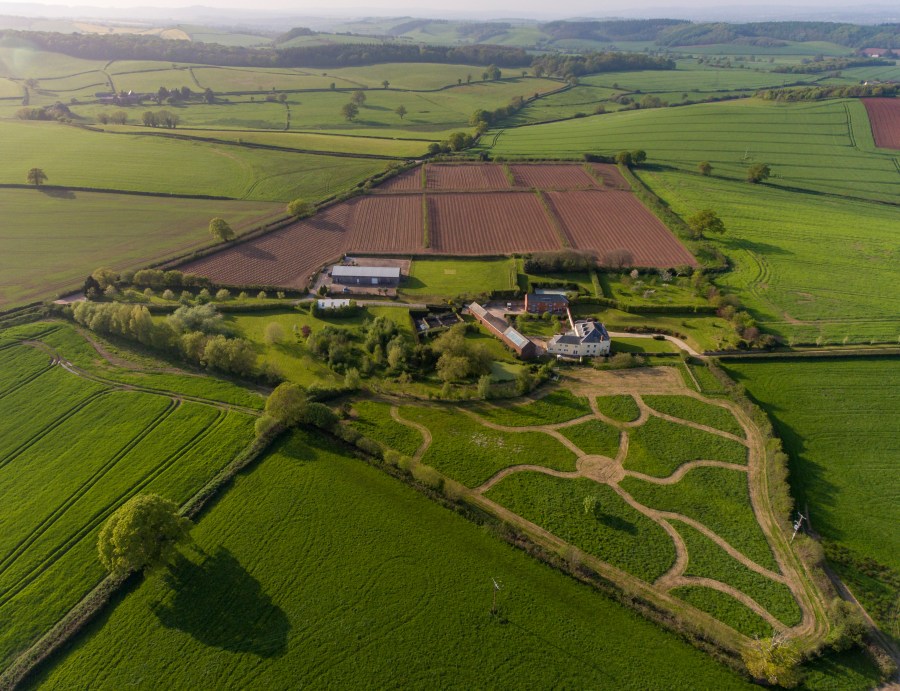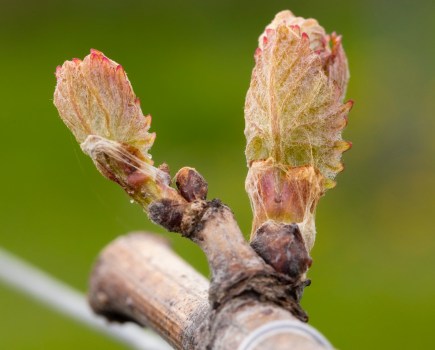After Ian and Jayne Oliphant-Thompson purchased Kenton Park Estate on the outskirts of Exeter, Devon in January 2017 work quickly began to re-establish its former vineyard which had been grubbed by the previous owner.
“It is one of those things you say, wouldn’t it be fabulous to own a vineyard,” said Jayne Oliphant-Thompson. “The property was marketed as a small country sporting estate, but we knew the previous owner had successfully grown vines and produced wines. There wasn’t any debate about putting the vineyard back, it was just something we wanted to do.”
As Ian continues to manage his own corporate training and consultancy business, the replanting of the vineyard has largely been driven by a motivation to create business opportunities for Jayne and Ian’s three children and while producing a leading wine brand may not be top of the agenda, Kenton Park Estate certainly demonstrates numerous ways to make an estate pay.
Preparing to plant
With little knowledge of viticulture, and having visited vineyards in the Hunter Valley and Stellenbosch primarily to find inspiration for the wine bar’s interior design, the journey began with the family investing in consultants and contractors to get the vineyard underway.
“I am lucky to have found Duncan McNeil who has been able to help us,” said Jayne. “He said that we have a fabulous site here and advised on what we could do. He has helped us with the preparation processes, getting the soil analysed and putting down a cover crop, and has told us which varieties to plant.”
Having not yet acquired any machinery, finding it easier to hire what they need, all the vineyard preparation work on the site has been carried out by local contractors, Sampson Agricultural Services.
“We have no equipment,” said Jayne. “I even felt chuffed a few weeks ago when I went to buy a wheelbarrow. It is easier to bring in the professionals because they can do it in half the time. These days you can simply find everything online. When the galvanised steel posts were delivered for instance, we needed a forklift truck so we just hired one.”
With a lot of work having been carried out over the past year to properly prepare the land, the family were greatly anticipating planting which took place over the early May Bank Holiday weekend.
“We told Duncan what we would like to plant and he told us what would be realistic,” said Ben Oliphant-Thompson, Ian and Jayne’s son who will be managing the vineyard. “We ordered 14,500 vines of Bacchus, Reichensteiner, Pinot noir, Solaris and Pinot tin, a new powdery mildew resistant variety. We also have 500 vines of Chardonnay to experiment with and a small block which we can expand into if it grows well.”
Learning to supervise
As well as preparing the land, the family have also been preparing educationally for the management of the vineyard and both Ben and Jayne have been on various courses at Plumpton College such as the principals of vine growing and managing disease in the vineyard.
“Plumpton has been really good,” said Ben. “I did the one week intensive course. You are bombarded with information and there is a lot to take in but it was fun and a really nice place.”
Having completing the courses, Jayne believes that the knowledge gained will be used more for co-ordination than practical work and she has already planned to bring in labourers, having booked Vine Care’s team well in advanced for pruning time.
“I don’t think Ben will like the hard work quite frankly and I think he would rather supervise it,” said Jayne. “We will be bringing in that labour and won’t try to do it ourselves. We are educating ourselves not because we expect to become pruning experts but, as Mark Driver at Rathfinny told us, you have to know what you are talking about to be able to brief people.”
The family has also already considered the need to find a more permanent vineyard manager further down the line as alongside being responsible for the vineyard Ben is also a semi-professional rugby player for the Taunton Titans’ first team and it is unknown what opportunities may arise in his sporting career.
Own label produce
Agreeing that they will not be investing in winery equipment, Ben has already started discussing contract winemaking options with Lyme Bay Winery, however Jayne has also considered taking more of a contract grower role, seeing the primary function of the vineyard as a chance to leave a legacy for the next generation.
“We may just grow our grapes and sell them,” said Jayne. “We don’t have a vision in mind but take things as they come along. Ben is happy to be involved now but he might change his mind. It is not, for me, based around the vineyard, it is what else we can achieve from the estate. A strong drive was to leave a legacy for our children and it is great to be able to give this as an opportunity to Ben, whether he wants it or not.”
Keen to see the estate pay for itself, while people usually establish the vineyard and then look at putting in tourism facilities, Kenton Park Estate already offers accommodation, space for corporate events and weddings, and has also opened a wine bar in the old winery.
With no wine being currently produced from the estate, the wine bar has been stocked with other English producers, such as Pebblebed and Chapel Down and, to establish the brand as soon as possible, the Oliphant-Thompsons will be launching an own label English sparkling wine, Motley Cru, at the end of May 2018.
“People like to get to know a label,” said Jayne. “Our own product range helps us tell a story because it will be eight years before we have our own sparkling and we don’t want to wait like others have done. It puts us on the map and the own label products will help us to invest back into the business.”
As well as own labelled wine, Kenton Park Estate now has its own cider, produced from apples grown in the orchard, its own coffee, which is hand roasted locally, an olive oil, imported from Italy, and with five beehives on the estate honey is also on the cards.
“We are having a candle range produced for us and I also want to start a beauty range,” said Jayne. “I am working with a local laboratory on a skin care brand and we are planning to use grape extracts because it is another link to what we do here and eventually we will be able to use our own grapes too.”
With the estate surrounded by Powderham Castle’s shooting ground Jayne has drawn inspiration from the pheasants often seen at the vineyard and a range of characters has been designed by cartoon illustrator Bryn Parry.
“We have given all the pheasants names so far,” said Jayne. “Roger is the olive oil pheasant, Remy is our cider pheasant, Flash rides though the vineyard on his motorbike, Grape Escape runs through and steals the grapes, Great Escape is jet propelled on his motorbike by his bottle of English sparkling wine and Pluckington represents our honey brand.”
Channels to market
Identifying their key markets early, Jayne doesn’t envision selling to local outlets and instead sees the estate’s focus on corporate clients and events, building on Ian’s training and consultancy business connections.
“You have to look at your channels to market as soon as possible and ours is primarily Ian’s corporate network,” said Jayne. “We have worked for a long time running a consultancy business with international clients and that has to be our client database. We can’t really compete with the other vineyards, so we have to establish our own unique way of being and won’t just rely on selling in the local farm shops and outlets.”
Focusing on Ian’s knowledge and previous experience in organising corporate training days, Jayne is keen to use the old winery building for as many professional functions as possible and has already been approached by companies looking to host seminars, monthly breakfast meetings and team building days.
“In June, the Exeter PA Network will be bringing 50 delegates to the estate,” said Jayne. “They wanted to do something about rejuvenation so we have organised for them to go out into the newly planted vineyard where they will be digging soil into pots and planting something. It is a bit different but a good way for us to get our name out there because these personal assistants often book the venues for their own company functions.”
Alongside corporate events Kenton Park Estate has recently held a car tour, called the Grape Escape, for the Torbay Motor Club to help generate word of mouth recommendations about the event facilities.
“I used to run a business school for women in Exeter so it would be interesting to run courses too,” said Jayne. “We could cover anything from learning about how to run a business to craft work. Ben has just been on a cocktail making course in Miami so he would be able to run masterclasses and we could put on a great night teaching a few fun cocktail recipes.”
Diverse range of projects
Accommodation, with access to a hot tub and heated swimming pool, is also on offer at the estate and with the one bedroom self-catering apartment called the Vineyard Retreat having taken 18 booking in its first year, Jayne has since invested in a shepherd hut, called the Woolly Shack to expand their offering.
Seeing themselves as an ‘unorthodox’ vineyard with plenty of other projects to be getting on with aside from the vineyard, Jayne is prepared to wait until the vines are more established before tapping into wine tourism and vineyard visits.
“Corporate events may want to spend half an hour walking around the vineyard but at the moment we don’t really have a vineyard,” said Jayne. “We have had a lot of emails from people who have heard that we are replanting but it is not ready for visitors. When the vineyard looks nice we will look at going into wine tourism but I want people to visit when there is something to see other than a lot of bare soil and steel structures.”
In the meantime, the estate has its own boutique clothing shop selling Spanish riding boots and wellingtons and Jayne has a diverse range of other ideas for the estate and has started considering hosting fashion shows, organising off road adventures, setting up an open-air cinema, hosting a pop-up opera and becoming a drone flying school with aerial photography courses.
Although this re-established English vineyard may not be entirely focused on producing wine, the family’s unorthodox approach certainly demonstrates how lucrative vineyards are as destinations and the possibilities estates have if they are seeking to open to the public.




